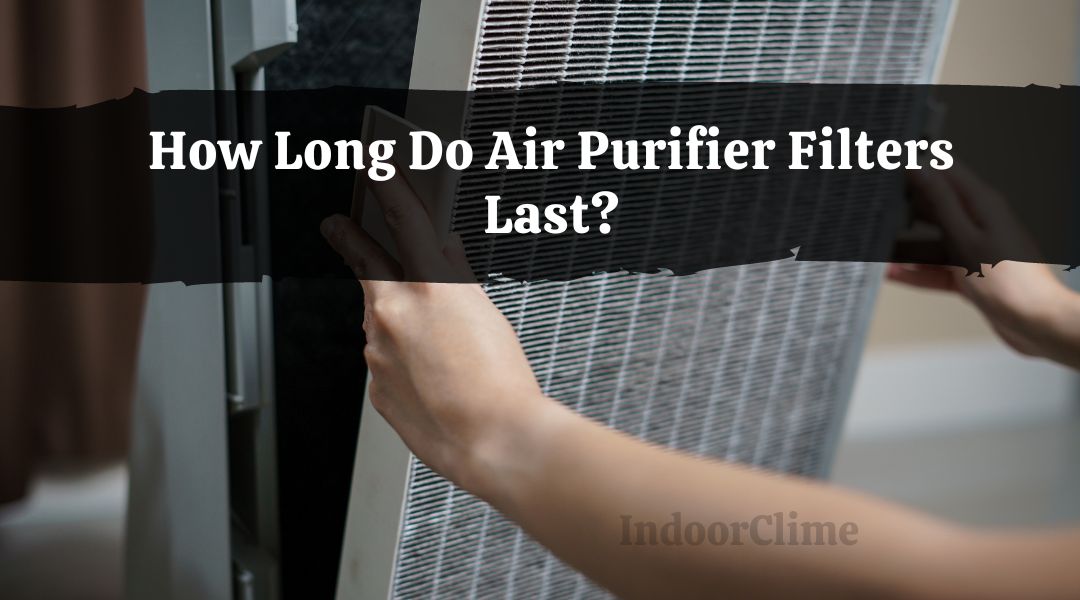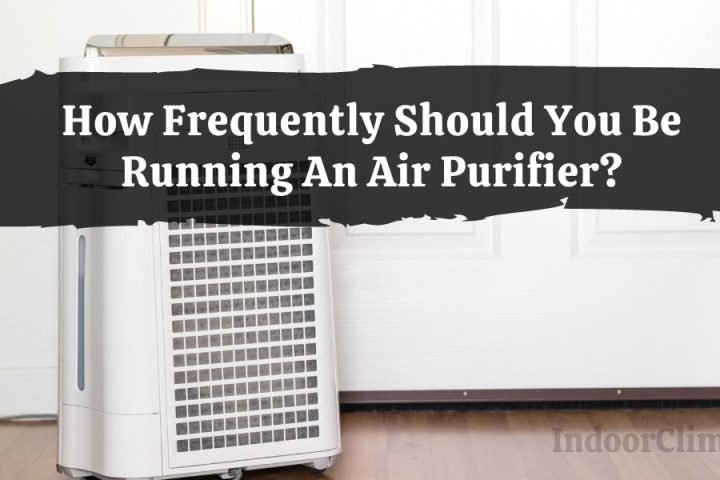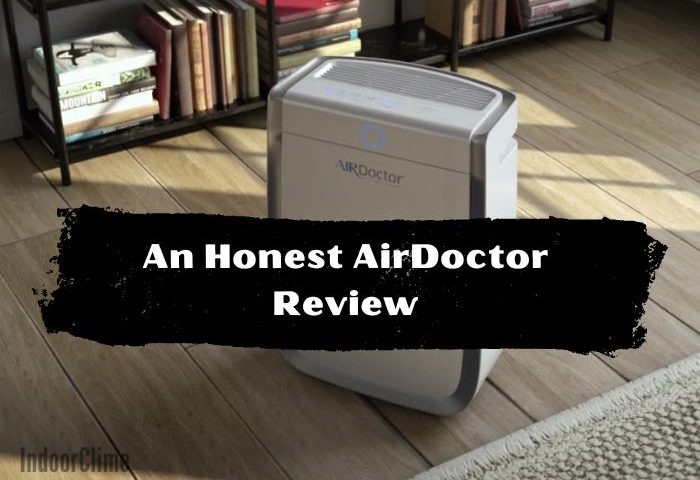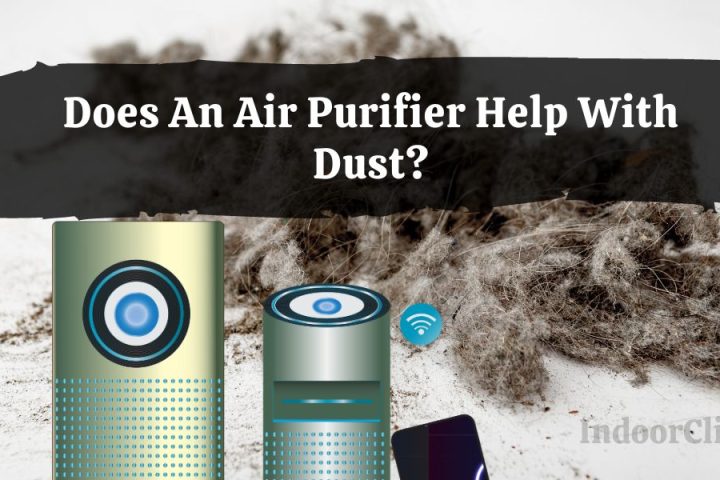An Air Purifier can offer health benefits and fresher air; however, you must know how long air purifier filters last. Your home is likely an important place in your life.
It is where you receive your news, watch television, and spend time with family. Unfortunately, it is also known that people ingest many toxins inside their homes.
Air Purifier companies recommend replacing your HEPA filter every 3-6 months if you run your unit 24 hours a day, seven days a week, with the highest setting on low or mid-range settings. HEPA filters can clean the air over 40 times better than other filters, resulting in a longer lifespan.
The information below helps you determine how long your purifier’s filter will last before you consider replacing it.
How Long Do Air Purifier Filters Last?

Air Purifier filters can be made from different materials and work differently. Depending on the type of filter used, it may be possible to remove particulates, bacteria, and other contaminants by simply replacing the filter. However, some models have filters that need to be cleaned or replaced after a certain time.
Your Air Purifier has a sensor that measures the air quality in your home. The sensor measures particles in your home and gives them a number between 1 and 100. The lower the number, the cleaner your indoor environment is.
- The filter will last six months if the air quality is good on level 2.
- The filter will last nine months if the air quality is good on level 3.
- If the air quality is good on a level 4 or 5, it will last 12 months.
The good news is that most high-quality air filtration systems use standard-size filters and can be changed quickly and affordably.
How to Know When It’s Time to Replace Your Filter

Regardless of the duration of your filter, it is always essential that you check the health of your filter before replacing it. Here are some ways to identify it.
Steps in identifying the right time to replace your filter
- Separate the filter and hold it up to a light source; if you can see through more than 75% of the material, it is still in good condition and does not need to be replaced.
- When the indicator light (if your model supports this feature) turns yellow, it’s time to change your filter. It’s the first stage of your filter’s lifespan and should last between one and six months.
- When the beacon light turns red, replacing the filter with a brand-new one is time. How regularly you use your air purifier will happen anywhere between 6 months and two years.
- When you notice that your allergies are acting up more than usual
- Sneezing, sniffling, itchy eyes, or other allergy symptoms can signify that it’s time to change out that filter.
- If something smells funny coming from the vents in your home, it could be a sign that mold or mildew is growing on the filter.
Ways To Extend the Life Of Your Filter For a More Affordable Solution
While Air Purifiers are a powerful way to eliminate the allergens and pollutants that bother you, you may not want to replace your filter as often as your manufacturer recommends. Doing so can be very expensive. To make it effortless on your budget, try these tips for extending the life of your air filters.
- Cleaning: You should clean the filter about once a month by vacuuming or brushing off the surface, which will help remove any dust and dirt accumulated.
- Adjusting: If the airflow isn’t as strong as used, adjust the fan speed to turn it down a notch. The filter will last longer since moving air through won’t work as hard.
- Ventilation: If your home is kept very warm or cool, set your air filters in front of a fan or, better yet, an open window so they can get cooled down more frequently. It will also help with circulation, more effectively removing impurities from the air.
- Exhaust fans: Use exhaust fans in bathrooms and kitchens to remove odors from areas prone to cooking and bathing, which can contribute to the scent of your home’s air quality.
How Do I Know If My HEPA Filter Is Dirty?

HEPA filters come in various shapes and sizes, but they all have one thing in common: over time, they get dirty. When that happens, the filter becomes less effective at doing its job.
- If you notice that the air is not blowing out of your device as it used to, it could be time to change your filter.
- If you see that suddenly, you feel more stuffy around your nose or throat when using your device.
- If you can see dust buildup after vacuuming off your HEPA filter.
Tips to ensure the filter is working properly
- Watch for a loss in suction.
- Listen for any increases in noise.
- Look at the air coming out of the exhaust.
How Often Should HEPA Filters Be Changed In a Cleanroom?
HEPA filters are high-efficiency particulate air filters tested to meet the highest air filtration standards. They can trap up to 99.97% of particles as small as 0.3 microns.
Filters should be changed every two years for conventional cleanrooms and every six months for laminar flow cleanrooms. Based on several factors:
- The level of dust in your environment
- The number of people who enter the cleanroom
- The amount of equipment and objects that go in or out of the room each day
Note: If you don’t change your filters for a long time, you risk allowing a lot more particles into the air than was intended when the room was initially created.

What Is a Cleanroom?
Cleanrooms are enclosed spaces designed to contain controlled contaminants, such as dust and microbes, to minimize the possibility of contamination by external sources.
One problem with cleanrooms is that HEPA filters become clogged over time. While they help provide excellent protection in the short term, they need to be changed often to avoid performance degradation.
Can You Wash Air Purifier Filters?
The short answer is yes. The process of washing an air purifier filter requires a delicate hand.
When considering whether to wash your air purifier filter, keep the following tips in mind:
- First, unplug your cleaner and wait for it to cool down.
- Place your filter in a sink full of warm water with a drop or two of mild dishwashing liquid or laundry detergent (avoid using bleach or chlorine-based cleaners)
- Let the filter soak for 10 minutes, then rinse thoroughly under warm running water.
- Use a soft brush to mildly scrub away any residue from the surface of the filter.
- Ensure all soap is rinsed off before putting your filter back in place.





